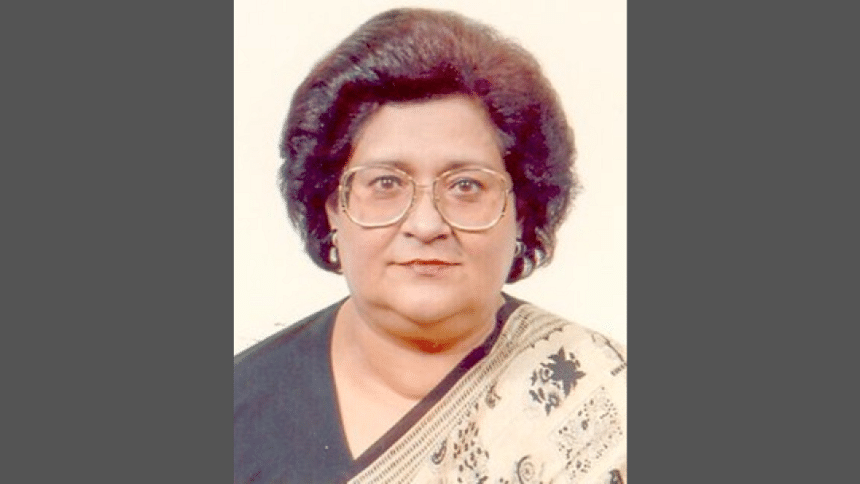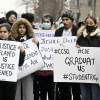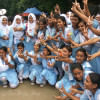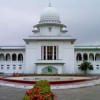The passing of a quiet revolutionary

On July 31, 2025, Bangladesh lost one of its silent revolutionaries: Mrs Yasmeen Murshed. She was best known as the founder of Scholastica school, but she was also a businesswoman, a diplomat, and a civil society leader.
Most students of my generation and after did not have many interactions with Mrs Murshed. This is because soon after our move to Scholastica's senior section (where she was based), she became preoccupied with her appointments as adviser to the government in 2006 and then high commissioner to Pakistan in 2007. However, I lived every day in the institution she built, walked through the halls she envisioned, and benefited from an educational system she pioneered.
In 1977, Yasmeen Murshed rented a two-storey building in Dhanmondi to establish the school to realise a vision: to provide a structured English-medium curriculum in post-independence Bangladesh that could prepare the next generation for a globalising world. She understood that even in the era of decolonisation, English proficiency could make or break one's chances of success in the modern world. What began as Scholastica Tutorial slowly transformed into one of the country's most influential English-medium institutions, with branches all over Dhaka's key neighbourhoods. Scholastica's journey is not just one about business expansion. It is a story of Mrs Murshed's perseverance, foresight, and a refusal to settle for the norm.
Scholastica was far from perfect, but it was, in many ways, ahead of its time. In a country where gender roles remain deeply entrenched, I now realise how rare the institute's emphasis on equality of opportunities was. I remember how, in Grade 6, it was the girls' handball team that flew to an international tournament in Italy instead of the boys' football team. I remember how in Grade 4, all the boys from my grade were cheering on the girls as they battled it out in an inter-school tournament, instead of the other way round.
I remember how the senior leadership of the school, both academic and administrative, was overwhelmingly female. And then there's STM Hall, built and named after her late husband, Syed Tanweer Murshed. A hall where generations of Scholastica students would graduate, perform, and debate their way into adulthood. That a Bangladeshi woman could honour her husband's memory by building a modernist architectural structure on a major highway in the capital of a country where the vast majority of women are precluded from owning any landed property also seems, in retrospect, like a quiet revolution. At the time, none of this felt extraordinary. Only years later, when I joined the development sector and saw the many ways gender inequality manifests, did I fully grasp how unusual that environment was and how intentional it must have been.
Mrs Murshed also believed that education should not begin and end with books. Long before "holistic learning" became a buzzword, she worked to institutionalise extracurriculars (such as drama, art, music and debate) as an integral part of Scholastica's pedagogy. Scholastica also had a dedicated internship office (possibly one of the firsts of its kind in the country), which helped high school students secure summer placements. It is through these internships that I gained my first round of professional experience (first at Rahimafrooz and then at JAAGO Foundation). They helped me realise quite early on that I was meant for the public sector, not the private one.
At the same time, Mrs Murshed did not believe that modern secular education needed to be at odds with religious identity. In a country where the education system is deeply bifurcated, split between so-called "mainstream" schools and madrasas, her approach was, in retrospect, quite groundbreaking. Religious instruction in most households entailed children learning how to recite the Quran phonetically, without translation or interpretation. Mrs Murshed chose a different path. At Scholastica, every morning assembly began with a recitation of Surah al-Fatiha, first in Arabic and then in English, followed by the national anthem. She introduced a subject called Islamiyat and even authored the textbooks herself. These books did not treat the Quran as a text to be committed to memory in fragments, but as a source of ethical thoughts. We were not asked simply to recite; we were invited to think. I remember reading the story where three children are asked by their father to go somewhere where no one could see them. One hides in a cupboard. Another crawls under the bed. The third searches quietly, then returns and says, "There is no such place. Wherever I go, God can still see me." That was the first time I truly understood what it meant that God is all-seeing.
Outside the classroom, she created Etcetera, possibly Dhaka's first departmental store that felt like a portal to a mall in Singapore or Kuala Lumpur. I looked forward to going there every Thursday evening after school, browsing the latest DVDs and CDs. Etcetera also introduced the book-cafe culture through Coffeeworld, where you could sip a flavoured iced latte while reading a Booker-nominated paperback without having to purchase it. It is hard to explain how rare such a place was in Dhaka in the early 2000s, where there was very little to do by way of recreation.
Of course, not everything Scholastica (or Etcetera, for that matter) represented was radical or accessible. It remained a private enclave catering to a particular class. But within that space, Yasmeen Murshed carved out something rare. And many of us, whether we realised it at the time or not, absorbed values that shaped how we saw ourselves and our role in society.
She has now passed on to her Creator. But undoubtedly, she lives on through the works of the thousands of students quietly shaped by the institution she built. Mrs Murshed did not just found a school; she fundamentally altered the trajectory of Bangladesh's educational and cultural landscape. May she rest in eternal peace.
Taqbir Huda is a human rights lawyer and a contributor for The Daily Star. He can be reached at [email protected].
Views expressed in this article are the author's own.
Follow The Daily Star Opinion on Facebook for the latest opinions, commentaries and analyses by experts and professionals. To contribute your article or letter to The Daily Star Opinion, see our guidelines for submission.

 For all latest news, follow The Daily Star's Google News channel.
For all latest news, follow The Daily Star's Google News channel. 








Comments